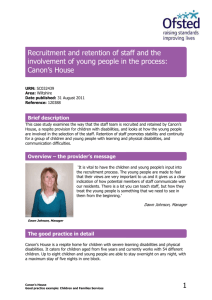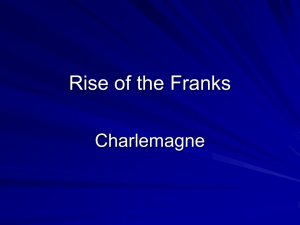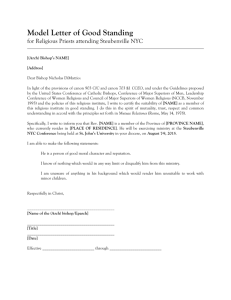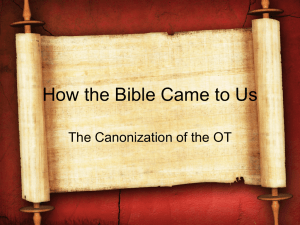NACM Model Code of Conduct for Court Professionals
advertisement
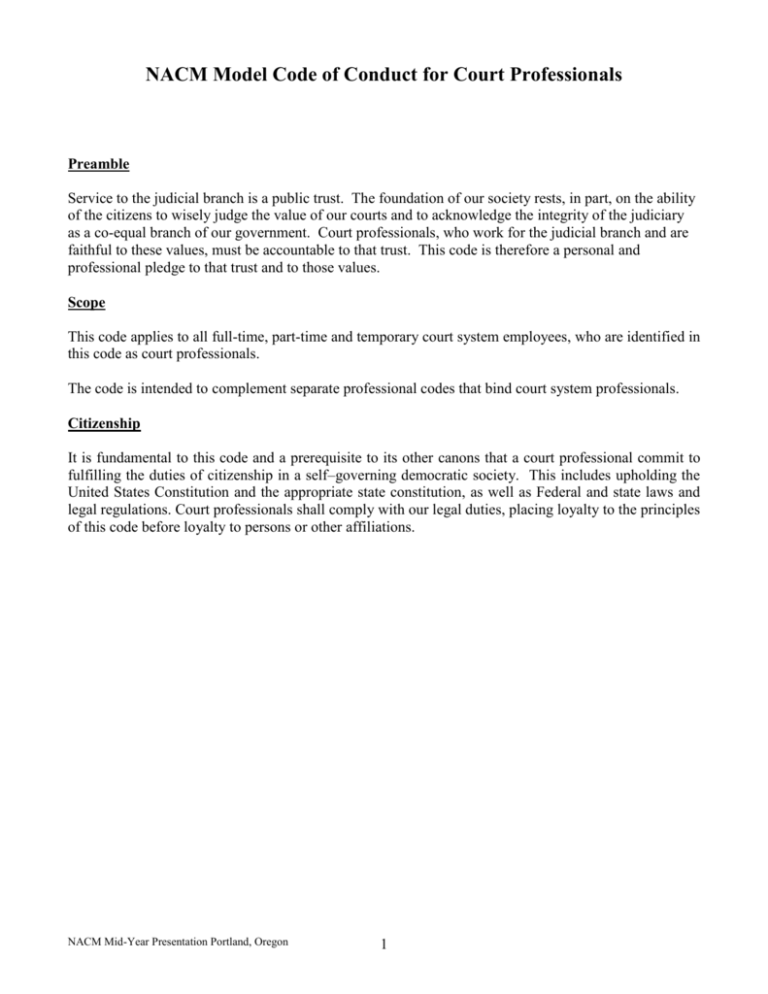
NACM Model Code of Conduct for Court Professionals Preamble Service to the judicial branch is a public trust. The foundation of our society rests, in part, on the ability of the citizens to wisely judge the value of our courts and to acknowledge the integrity of the judiciary as a co-equal branch of our government. Court professionals, who work for the judicial branch and are faithful to these values, must be accountable to that trust. This code is therefore a personal and professional pledge to that trust and to those values. Scope This code applies to all full-time, part-time and temporary court system employees, who are identified in this code as court professionals. The code is intended to complement separate professional codes that bind court system professionals. Citizenship It is fundamental to this code and a prerequisite to its other canons that a court professional commit to fulfilling the duties of citizenship in a self–governing democratic society. This includes upholding the United States Constitution and the appropriate state constitution, as well as Federal and state laws and legal regulations. Court professionals shall comply with our legal duties, placing loyalty to the principles of this code before loyalty to persons or other affiliations. NACM Mid-Year Presentation Portland, Oregon 1 Canon 1: Avoiding Impropriety and the Appearance of Impropriety in All Activities Canon 1.1 - Performing Court Duties A court professional shall faithfully carry out all appropriately assigned duties striving at all times to perform the work diligently, efficiently, equitably, thoroughly, courteously, honestly, truthfully and with transparency. A court professional shall carry out properly issued court orders and rules, not exceeding the court professional’s authority. Canon 1.2 - Avoiding Impropriety A court professional shall avoid both impropriety and the appearance of impropriety. A court professional shall avoid improper influences from business, family, position, party, or person. A court professional shall avoid activities that would impugn the dignity of the court. Canon 1.3 - Fairness A court professional shall conduct his or her work without bias or prejudice including, but not limited to, bias or prejudice based upon race, gender, skin color, religion, age, sexual orientation, national origin, language, marital status, socioeconomic status, or physical or mental challenge. Canon 1.4 - Respect of Others A court professional shall treat litigants, co-workers and all others interacting with the court with dignity, respect and courtesy. Canon 1.5 - Involvement in Actions Before a Court A court professional shall notify the appropriate authority whenever he or she, anyone in his or her family, or anyone with whom he or she has a close personal relationship has been arrested, named as a party, or is otherwise formally involved in any action pending in any court. Canon 1.6 - Avoiding Privilege A court professional shall use his or her official position solely for its intended purpose. A court professional shall not use his or her position (intentionally or unintentionally), to secure unwarranted privileges or exemptions for oneself or others; a court professional shall not dispense special favors to anyone, whether or not he or she was offered remuneration. A court professional shall not attempt to take advantages of his or her enhanced access to judges and court files to further any personal interest he or she might have in a case or engage in court related ex– parte discussions with judges. Canon 1.7 - Assisting Litigants A court professional shall be responsive to inquiries regarding standard court procedures, but shall not give legal advice unless it is required as part of one’s official position. NACM Mid-Year Presentation Portland, Oregon 2 Canon 2: Performing the Duties of Position Impartially and Diligently Canon 2.1 - Independent Judgment A court professional shall avoid relationships that would impair one’s impartiality and independent judgment. A court professional shall be vigilant of conflicts of interest and ensure that outside interests are never so extensive or of such nature as to impair one’s ability to perform court duties. Canon 2.2 - Personal Relationships A court professional shall recruit, select, and advance personnel based on demonstrated knowledge, skills, abilities, and bona fide work–related factors, not on favoritism. A court professional shall avoid appointing, assigning, or directly supervising, a family member, or attempting to influence the employment or advancement of a family member. Where circumstances dictate that one must work directly with a family member, a court professional shall report the circumstance to an appropriate authority, regularly assess the situation, and take remedial action at the earliest time practicable. Canon 2.3 - Misconduct of Others A court professional should expect fellow professionals to abide by the canons set out in this code. A court professional shall report to the appropriate authority the behavior of any court professional who violates this code including, but not limited to, potential conflicts of interest involving one’s duties and attempts to inappropriately influence one in performing one’s duties. Canon 2.4 - Attempts at Influence A court professional shall immediately report to the appropriate authority any attempt to compel one to violate these canons. Canon 2.5 - Properly Maintain Records A court professional shall not inappropriately destroy, alter, falsify, mutilate, backdate or fail to make required entries on any records within the court’s control. Canon 2.6 - Legal Requirements A court professional shall maintain the legally required confidentialities of the court, not disclosing confidential information to any unauthorized person, for any purpose. A court professional shall properly provide confidential information that is available to specific individuals authorized to receive such by reason of statute, court rule or administrative policy. Canon 2.7 - Discretion A court professional shall be respectful of litigants, the public, applicants and employees’ personal lives; disregard information that legally cannot or should not otherwise be considered; use good judgment in weighing the credibility of Internet data; and be cautious about verifying identities. A court professional shall treat personal or sensitive information with the same discretion that one would wish others to have if one were involved in a similar case. Canon 2.8 - Proper Use of Public Resources A court professional shall use the resources, property and funds under one’s official control judiciously and solely in accordance with prescribed procedures. NACM Mid-Year Presentation Portland, Oregon 3 Canon 3: Conducting Outside Activities to Minimize the Risk of Conflict with Official Position Canon 3.1 - Outside Business The court is a court professional’s primary employment. A court professional shall avoid outside activities, including outside employment, business activities, even subsequent employment and business activities after leaving judicial service, that reflect negatively upon the judicial branch and on one’s own professionalism. A court professional shall notify the appropriate authority prior to accepting work or engaging in business outside of one’s court duties. A court professional shall not request or accept any compensation or fee beyond that received from their employer for work done in the course of their public employment. However, court professionals may engage in outside employment as long as it does not conflict with the performance of their official responsibilities or violate this code. Canon 3.2 - Compensation and Post-Employment Restrictions During or following one’s employment with a court, a court professional shall not represent a commercial interest to, or do business with, that same court unless both the employment and commercial interest are fully disclosed to and approved by the court’s appropriate management authority. Canon 3.3 - Avoiding Gifts A court professional shall not solicit, accept, agree to accept, or dispense any gift, favor, or loan either for oneself or on behalf of another based upon any understanding, either explicit or implicit, that would influence an official action of the court. Canon 3.4 - Financial Disclosure A court professional shall dutifully disclose all financial interests and dealings required by law, rule, or regulation. NACM Mid-Year Presentation Portland, Oregon 4 Canon 4: Refraining from Inappropriate Political Activity Canon 4.1 – Political Activity A court professional retains one’s right to vote and is encouraged to exercise it as a part of citizenship. Engaging in any political activity is done strictly as a private citizen and only in accordance with state law or court rules. A court professional shall participate only during non-court hours, using only noncourt resources. A court professional shall not use one’s position or title within the court system to influence others. Unless a court professional is elected to one’s court position, one shall campaign during non-work hours or take an unpaid leave of absence upon declaring one’s intent to run for office. If elected, a court professional shall resign one’s post with the court unless one is holding a political office that clearly does not hold a conflict of interest, nor does it interfere with one’s ability to perform one’s court duties. NACM Mid-Year Presentation Portland, Oregon 5 SCENARIO No. 1 Bob’s Sister Bob Allen supervises the Superior Court’s civil and family sections. Although he has had enough interaction with parties and attorneys to know who’s a good attorney and who isn’t, he regularly instructs his staff to be fair and impartial. Bob’s sister, Mary, and her husband Larry have been separated for awhile, and Mary finally confesses to Bob, over Sunday at the parents’ house, that she and Larry were divorcing. Mary says that she has made an appointment the next day with Wendell Wimpwright. Bob knows Wimpwright’s reputation is to cave–in so his clients end up losing their shirts. Bob tells Mary to go see Tim Hutton, a solid and aggressive divorce attorney who charges a reasonable fee. Mary retains Hutton and does pretty well in the divorce. Larry doesn’t do nearly as well. He eats out of cans most nights in his new apartment across from the county jail. About the same time as Mary and Larry are divorcing Delores Bates also files divorce papers to separate from her husband, Bud. Delores asks the staff at the counter who she should call get as an attorney. Staff refers Delores to Bob who gives out the standard answer “we can’t advise you on who to hire.” Delores even tells Bob that she has called Wendell Wimpwright; Bob just gives Delores a blank look. Wimpwright caves (as usual) and Bud ends up with the house. Delores moves both kids into the same apartment that Larry lives in next to the county jail. When asked if recommending an attorney to his sister doesn’t violate the code of ethics Bob responds “The code of ethics is fine, but family comes first.” To Bob taking care of his kid sister is more important than debating the fine points of the code of conduct. Questions Is Bob right? Is there a limit to code of ethics? Is there a point where family legitimately does “comes first?” If so when? Are there circumstances or locations where Bob could have recommended an attorney to Delores? If Delores had met Bob socially at a Starbucks, for example, would recommending an attorney have been okay then? Are there practical reasons why it is important not to share staff preferences with the public? NACM Mid-Year Presentation Portland, Oregon 6 SCENARIO No. 2 Mary’s Favorite Cause Mary George is the Court Administrator for the Staunch County Superior Court. Mary is well-known in the community for her commitment to court excellence. In addition, Mary is very active in her church and holds strong views regarding her beliefs. Staunch County has historically been a dry county, meaning that no liquor is sold within the county boundaries. However, a recent petition has been circulated to the community to get a referendum on the ballot to allow liquor to be sold in the county. The petition was successful in collecting sufficient signatures to place the measure on the ballot in a few months. Because of Mary’s excellent organization skills and the respect for her in the community, she has been asked to be the chairperson of a committee to mobilize community opposition to the referendum. In that role, she will be responsible for setting up a phone bank to call members of the community to ask them to vote NO on the proposal. Questions Can Mary participate in the committee as the chairperson? If you do not think she can be the chairperson, can she have other involvement in the committee? If you do think she can be the chairperson, are there any steps that she should take before accepting the position? Do any of your previous answers change if Mary is not the court administrator, but rather a deputy clerk who is not well-known? Is it a violation of Mary’s free speech right if someone tries to forbid Mary from chairing or participating in the committee? Why or why not? Do your answers change if Mary had been asked to be the chair the campaign committee of a nonpartisan candidate for the County Board of Supervisors? NACM Mid-Year Presentation Portland, Oregon 7 SCENARIO No. 3 Carole Sherman’s Public Duty/Private Lives Carole Sherman My name is Carole Sherman and I’ve been a deputy clerk in a small court in northern Connecticut for seven years. The court has one judge and five deputy clerks. I’ve always gotten outstanding performance evaluations. Our job descriptions include issuing marriage licenses and doing wedding ceremonies during the business day. Three of us in the office rotate the “wedding duty” so we each take our turn, and it’s never been a problem in the past. It’s actually kind of fun. Last week the Supreme Court ruled that same-sex marriage is now legal in Connecticut. Clerk of Court Joe Campanella says that I have to perform those marriages whether I like it or not, and I could lose my job if I refuse. Why can’t we just adjust the “wedding” rotation so other employees do those ceremonies instead of me? I’ll gladly do more than my share of other work in exchange. Joe is forcing me to choose between my moral standards and feeding my kids. It seems to me the rules have changed after I was hired, and it’s not fair. Joe Campanella I’m the Clerk of Court in Litchfield, Connecticut. When I took office I swore an oath to uphold and defend the constitution and to follow the law. The deputy clerks took the same oath. The law has now changed and Carole can’t refuse to perform a legally required function. We would have chaos in the office if employees got to choose the duties they perform because of some claimed religious or moral preference. The fact that other employees could do the job instead is not the point. What if the other employees are out sick? What if Roger decides tomorrow that he doesn’t like Brown vs. Board of Education and won’t serve Blacks? Carole and any other employees cannot pick and choose which members of the public they serve and which Supreme Court decisions they follow. It’s unethical and illegal. Roger Winthrop I’m Carole Sherman’s co-worker, and I take my turn with Carole on “wedding duty.” I don’t understand what the big deal is with same sex marriage ceremonies – we ought to just treat everybody the same and do the ceremonies and follow the law like Joe says. On the other hand, we all know Carole is very religious and doesn’t want to follow the Supreme Court decision. As long as we have enough staff in the office, I don’t mind, I’ll do them instead. After all, Joe always let Carole take the day off on Good Friday every year, we all get Christmas off whether we’re Christians or not. I say live and let live as long as the public still gets the service they need. What’s the alternative, fire a great employee like Carole just because the rules changed last week? And besides, what if the case is appealed to federal court and the rules change again next week? I think Joe has to relax for now and we’ll just work around it. Questions for Joe On highly controversial social issues like same sex marriage or abortion or some others, is it fair or reasonable to potentially fire Carole based on shifting requirements and laws? During times of military draft, citizens are allowed to claim conscientious objector status and perform other functions instead. How is this any different? Question for Carole What if a Jewish school bus driver refuses to drive your kids to school on the Sabbath or a Muslim school cafeteria worker refuses to feed your kids lunch during Ramadan? Should those religious positions be accommodated too? Question for Roger There are some smaller court offices in Connecticut with even fewer employees. If a clerk’s office doesn’t have anyone available or willing to perform same sex ceremonies, should the employees be fired under those circumstances? NACM Mid-Year Presentation Portland, Oregon 8

